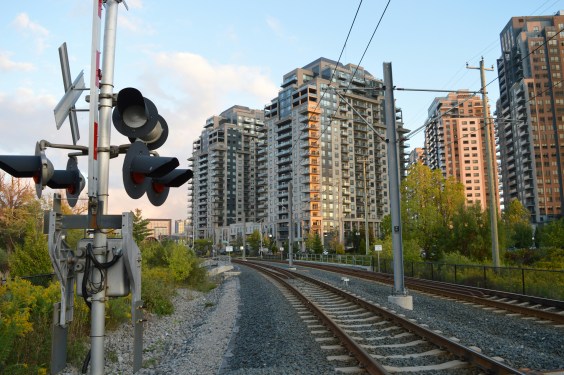The White House is re-centering
its message around economic and fiscal concerns ahead of tomorrow's
State of the Union address, with a new package of job-creation measures
expected to vault to the top of the agenda and a three-year "spending
freeze" pitched to deficit-wary conservative Democrats.
 Infrastructure:
Infrastructure:Democrats love it. But how will they fund it? (Photo: ShipDTS)
Yet despite data showing
that transit stimulus spending's effect on employment was nearly
twice as large as that of road projects, it's far from clear that the
Obama administration's pivot to the economy will prove a boon to
merit-based infrastructure investment.
One thing is clear: Democrats are finally catching on to broad
public support
for building more efficient and sustainable infrastructure. As
Robert Menendez (D-NJ), chief of the Senate majority's campaign
committee, put it to CNN on Sunday (emphasis mine):
[The economy] is something that I expect the president to
deal with in the State
of the Union speech, and something we will deal with as we deal with
the jobs package that talks about ... helping to look
at some of the infrastructure of the country, so people can get
to work right away ...
At the same time, White House adviser Valerie Jarrett was telling
NBC:
We are investing in infrastructure,
we are investing in public education so that our kids can compete going
forth into the next generation. We are investing in renewable energy,
to reduce our dependence on foreign oil. These are all connected to the
economy.
Of course, talking about a better built environment for the
nation is one thing; delivering is a messier and far lengthier endeavor.
Infrastructure encompasses more than just transportation networks, to
be sure -- but looking at the specific challenges of federal transport
funding, there remains but a small window for the Democrats to align
their fondness for the I-word with the White House's austere new message
on spending.
Part of the problem with federal transportation spending is that,
in budget-wonk parlance, it manages to be both mandatory
(set aside in a special trust fund replenished by the gas tax, not
Congress) and discretionary
(distributed every year according to obligation ceilings set by
Congress).
So will transportation funds be hit by the White House's proposed
"spending freeze," thus limiting the amount of available money for the
U.S. DOT's newly
revamped transit funding plan?
The
freeze would take effect based on funding levels in the 2011 White House
budget, which is set for release next week and could
well provide more money for sustainability efforts at the U.S. DOT.
Even if the U.S. DOT budget gets a boost before a freeze kicks in,
however, that tricky highway trust fund (which also
funds much of Washington's transit spending) remains short of cash.
If Congress and the administration can resolve their ongoing stalemate
over financing the next six-year transport bill before October, when
the fiscal year ends and the freeze kicks in, federal funding would be
on a more certain footing.
But if the next federal transport bill is delayed into 2011 or
beyond, which remains a very real possibility, money will likely have to
be transferred from the government's general fund into highway and
transit accounts.
The size of such a transfer is tough to predict -- Senate
legislation offered in July would
have spent $22 billion to keep transportation accounts solvent for
18 months -- but Democrats would face strong resistance to borrowing the
money for a highway trust fund rescue after diverting $15 billion from
the Treasury over the past two years.
So it's easy to envision a scenario where another highway trust
fund rescue requires cuts to other transport programs, putting federal
investments in infrastructure on an even less sure footing than they are
now.
And given the negative consequences of waiting too long to solve
the current transportation funding crisis, Democrats and the Obama
administration could make the tough decisions on taxes now, while
backing up their rhetoric on infrastructure with more
merit-based grants, or kick the can down the road again.
The predicament brings to mind House Speaker Nancy Pelosi's (D-CA)
comments to Washington Post blogger Ezra Klein back in July: Washington,
she said, is the "city of the perishable." Wait too long to act
decisively on a difficult issue, and you risk losing the chance to
address it at all.





